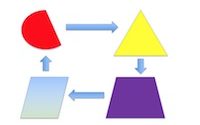
Preparing for ‘Era of Data Ubiquity’
Researchers convene to discuss how the deluge of data collected about students can be used to benefit higher education without compromising privacy. Inside Higher Ed
Premier Portal for Professionals Since 1995, Covering Technology-Based Education

Researchers convene to discuss how the deluge of data collected about students can be used to benefit higher education without compromising privacy. Inside Higher Ed

With the emergence of social software and the advance of web-based technologies, online learning networks provide invaluable opportunities for learning, whether formal or informal. Unlike top-down, instructor-centered, and carefully planned formal learning settings, informal learning networks offer more bottom-up, student-centered participatory but somewhat disorganized learning opportunities for students. This paper presents a research study where […]

Professional learning is crucial for the ongoing development of teachers and the improvement of student outcomes. Professional learning in mathematics and science education has the potential to address concerns about shortages in these areas and their impact on economic growth. However, attendance at face-to-face professional learning is problematic for many teachers located in rural areas. […]

Blogs are used in higher education to support face-to-face courses, to organise online courses, and to open up courses for a wider group of participants. However the open and distributed nature of blogs creates problems that are not common in other learning contexts. Four key challenges related to the use of blogs in learning were […]

Digital spaces are populated by youth who navigate, consume, create, and distribute information through their participation as designers, contributors, respondents, and distributors. A key prerequisite to collaboration, participation and distributed knowledge is trust. The literature informs us that the creation of trust involves several variables: the individual, their experiences, familiarity, and the environment (online, offline, […]

Design-based learning (DBL) has been considered a useful approach in teacher education because of its emphasis on the investigation of technology integration problems in design processes. Despite recent interest in understanding how technological, pedagogical, and content knowledge (TPACK) translates to action, limited research exists on how TPACK is developed within DBL contexts and what principles […]

Globalization has stretched the scope of the online learner population from a homogeneous profile of mostly adult, mostly employed, place-bound, goal-oriented, and intrinsically motivated to one that is heterogeneous, younger, dynamic, and responsive to rapid technological innovations. This paper describes the emerging characteristics of the online learner and ensuing pedagogical implications and suggests that exploratory […]

UA Online’s Launch Pad is designed to be a one-stop shop for success, whether it be prior to the start of classes or deep into a student’s academic career. The University of Arizona

In recent years, a number of models concerning problem solving systems have been put forward. However, many of them stress on technology and neglect the research of problem solving itself, especially the learning mechanism related to problem solving. In this paper, we analyze the learning mechanism of problem solving, and propose that when designing Web-based […]

The study buddy is a learning strategy employed in a graduate distance course to promote informal peer reviewing of assignments before submission. This strategy promotes student-student interaction and helps break the social isolation of distance learning. Given the concern by Arum and Roksa (2011) that student-student interaction may be distracting from instead of contributing to […]